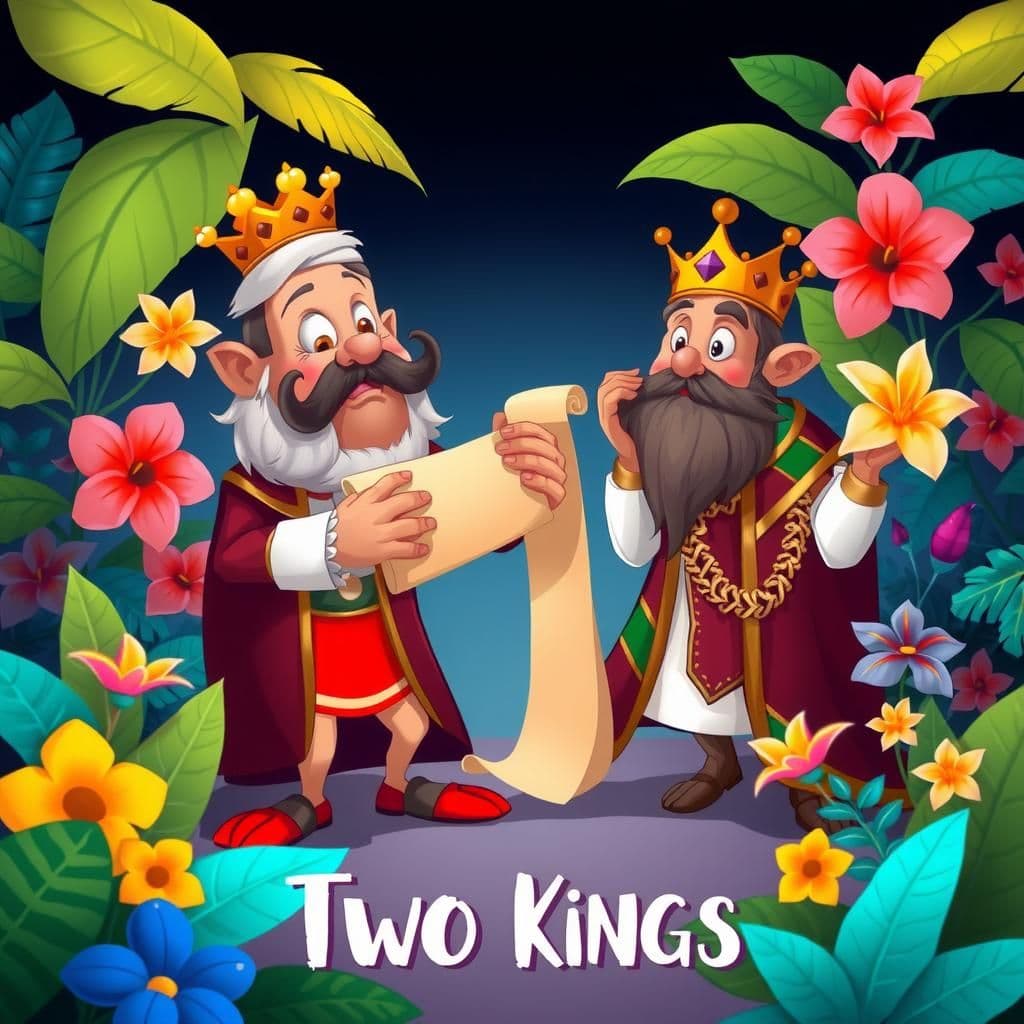Two Kings

Story Summary
In the short moral story "Two Kings," the King of Madagao, embroiled in a dispute with the King of Bornegascar, demands the recall of his rival's Minister. Faced with an enraged refusal and the threat to withdraw the Minister instead, the terrified King of Madagao hastily complies, only to comically trip and fall, humorously violating the Third Commandment. This tale, rooted in folklore, serves as a reminder of the consequences of pride and hasty decisions in well-known moral stories.
Click to reveal the moral of the story
The story illustrates that pride and stubbornness can lead to foolish decisions and unintended consequences.
Historical Context
The story reflects the rich tradition of fables and parables found in various cultures, particularly within African and Indian folklore, where kings and rulers often engage in humorous or absurd disputes that reveal deeper truths about human nature and governance. Its themes resonate with the moral lessons conveyed in Aesop's Fables and the Panchatantra, underscoring the folly of pride and the consequences of hasty actions. The mention of the "Third Commandment" adds a layer of moral and religious context, suggesting a blending of cultural narratives that critique authority and highlight the absurdities of political conflict.
Our Editors Opinion
This story illustrates the folly of making unreasonable demands and the potential consequences of pride and escalation in conflict. In modern life, this could reflect a workplace scenario where a manager insists on unrealistic project changes from a team member, leading to a breakdown in communication and productivity, ultimately causing the manager to lose valuable talent and trust.
You May Also Like

The Jackdaw and the Doves
In this famous moral story, a Jackdaw paints himself white to fit in with a group of Doves and enjoy their abundant food. However, when he inadvertently reveals his true identity by chattering, the Doves reject him, and he finds himself unwelcome among his own kind as well. This quick moral story illustrates that by trying to belong to two groups, he ultimately achieved neither, emphasizing the importance of authenticity and acceptance.

The Dolphins the Whales and the Sprat
In "The Dolphins, the Whales, and the Sprat," a fierce war erupts between dolphins and whales, highlighting the stubbornness often found in conflicts. When a Sprat offers to mediate their dispute, the dolphins reject his help, preferring destruction over accepting interference from a smaller fish. This quick read serves as a moral story for students, illustrating the consequences of pride and the refusal to seek assistance.

The Fox and the Monkey
In "The Fox and the Monkey," a boastful Monkey claims that monuments in a cemetery honor his illustrious ancestors, who were esteemed freedmen. The clever Fox highlights the ease of lying when there are no witnesses to challenge the falsehoods, illustrating that a false tale often betrays itself. This fable serves as a life-changing story with a moral, reminding readers of the importance of honesty in impactful moral stories.
Other names for this story
Royal Rivalry, Kings at Odds, The Disputed Throne, Clash of Monarchs, Crown Conflict, The Minister's Dilemma, Regal Standoff, Kingdoms in Turmoil
Did You Know?
This story humorously illustrates the absurdity of diplomatic disputes, where demands and threats can escalate to ridiculous levels, leading to unintended consequences that highlight the folly of pride and misunderstanding in communication.
Subscribe to Daily Stories
Get a new moral story in your inbox every day.